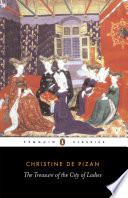Works

The Book of the City of Ladies
Christine de Pizan
The Treasure of the City of Ladies
Christine de PizanDe triste cuer chanter joyeusement
Christine de PizanFamous Christine de Pizan Quotes
Source: The Book of the City of Ladies
Quantes femmes est il qui usent leur vie au lien de mariage par la durte de leurs maris en plus grant penitence que se elles feussent esclaves entre les sarazins.
Part II, ch. 13, pp. 118-19.
Le Livre de la Cité des Dames (c. 1405)
Source: The Book of the City of Ladies
Source: The Treasure of the City of Ladies
Si la coustume estoit de mettre les petites filles a l'escole, et que communement on les fist apprendre les sciences comme on fait aux filz, qu'elles apprendroient aussi parfaitement et entenderoient les subtilités de toutes les arz et sciences comme ils font.
Part I, ch. 27, p. 63.
Le Livre de la Cité des Dames (c. 1405)
Source: The Book of the City of Ladies
Source: Der Sendbrief vom Liebesgott / The Letter of the God of Love
Christine de Pizan Quotes
Cellui ou celle en qui plus a vertus est le plus hault, ne la haulteur ou abbaisement des gens ne gist mie es corps selon le sexe mais en la perfeccion des meurs et des vertus.
Part I, ch. 9, p. 24.
Le Livre de la Cité des Dames (c. 1405)
Source: The Book of the City of Ladies
“[A] person whose head is bowed and whose eyes are heavy cannot look at the light.”
Source: Ditié de Jehanne d'Arc
Car en mon cuer porte couvertement
Le dueil qui soit qui plus me puet desplaire,
Et si me fault, pour les gens faire taire,
Rire en plorant et très amerement
De triste cuer chanter joyeusement.
Rondeau "De triste cuer chanter joyeusement", line 8; Maurice Roy (ed.) Œuvres Poétiques de Christine de Pisan (1886) vol. 1, p. 154, as translated by http://www.brindin.com/pfpistri.htm by Sheenagh Pugh.
Seulete suy et seulete vueil estre,
Seulete m'a mon doulz ami laissiée,
Seulete suy, sanz compaignon ne maistre,
Seulette suy, dolente et courrouciée.
Cent Balades, no. 11, line 1; Maurice Roy (ed.) Œuvres Poétiques de Christine de Pisan (1886) vol. 1, p. 12. Translation from Aliki Barnstone & Willis Barnstone (eds.) A Book of Women Poets from Antiquity to Now (1980) p. 203.
